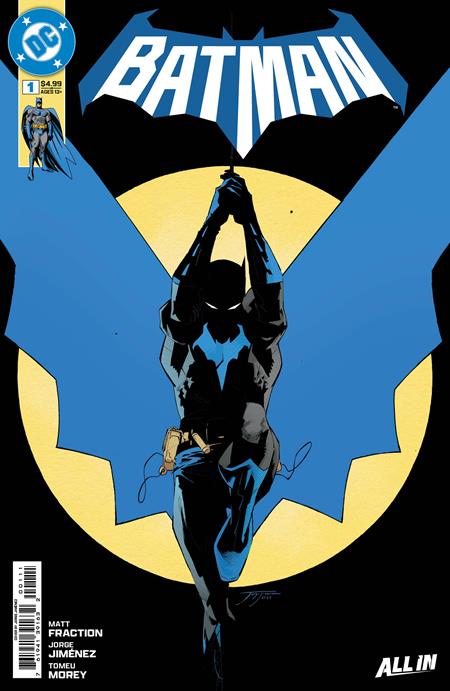The Beat participated in a roundtable at Anime Expo 2025 with TOWER OF GOD creator Lee Jong-hui (이종휘), also known by the pen-name SIU (“Slave In Utero”) to discuss his popular WEBTOON series, the “Urek Mazino” spinoff series, and why WEBTOON has exploded in recent years. At AX 2025, WEBTOON first revealed that the story centering on fan-favorite TOWER OF GOD character Urek Mazino would be released in English through their platform.
The “Urek Mazino” spinoff series updates every Tuesday. Check it out on WEBTOON.
This interview was conducted with a translator and has been edited for clarity.
SIU: The weather and food are excellent, and the readers are very passionate. They know what they like and will tell me what they want. Many have told me things they’ve been thinking about for a long time. Even though it’s my first time meeting them, it feels like meeting people I’ve known for a long time.
J.R. WAUGH: You have an affinity for naming your characters after soccer players and other references to real-life, pop culture, literature, like Mark Twain, and music, like “One Shot, One Opportunity.” Is that a coincidence, as the name rings a bell with Eminem fans? Are there any other pop culture references we can look forward to?
SIU: Recently, I’ve been trying to refrain from making a lot of references. The reason I used soccer player names is that I believe there are a lot of connections with the sport. The Tower itself is a very multicultural setting in and of itself, and when it comes to music or football or soccer, a lot of different cultures around the world enjoy it. So, I believe that in the future, if there are any other similarities or points that come across, I will probably use them.
EVAN D. MULLICAN: To follow up on that question, you mentioned that you’re trying to do fewer references. Since TOWER OF GOD has been around for so long, it’s such a big property. How have you grown as a creator since the manhwa began? Do you feel like your storytelling senses are sharper? Or, what is the one area you feel you’ve improved on since the first chapters?
SIU: Materialism is an extension of life. It’s fresh at first, but it gets boring later on. So, when it comes to plot elements, what’s really important is trying to keep it going. When it’s first introduced, it’s refreshing, but it can also become boring. So, as a creator, in the long term, what’s important is not boring the readers. As is probably the case with many creators who work on long-running series, they don’t want to bore the readers; they want to ensure that readers enjoy what they’re reading and try hard to maintain that enjoyment. As long as readers are reading, I will also try my best to do that.
OLLIE KAPLAN: Our readers at Comics Beat love TOWER OF GOD, so I want to follow up on something you said previously about when you heard some things that your fans have been thinking about for a long time. Do you have a favorite theory you heard or heard of? And is that going to influence your storytelling in the future?
SIU: I heard this at Anime Expo, and it was impressive. Something that made me a little perplexed, but also proud and great to overhear was people saying, “I made friends through reading TOWER OF GOD,” and that was the most impressive thing that fans spoke about. When a person enjoys a comic alone, they just enjoy it and have fun. But when everyone can come together, it becomes a culture. I was very proud to hear that, and I hope it will continue to become more of a culture within everyone’s circle who enjoys it, sort of like how events like the Anime Expo become a big part of culture. So, hopefully, that will continue and probably will affect my work in some way.
JAY GIBBS: You’ve previously mentioned that you came up with the ideas for TOWER OF GOD while doing your military service. Were there any aspects of the story that changed significantly from when you first started thinking about it to when it was published?
SIU: It didn’t change significantly. My perspective on it is still there, but readers’ perspectives keep changing. So, it’s more about the changes in culture and market. As I get older, there’s just that natural change. I have also changed the way that I think, but more than myself, the readers are also evolving. So rather than me as a creator, the readers, the market, and culture are changing. That’s usually where I get a lot of my inspiration from, too.
I guess the difference between when I was doing my military service and now is freedom—like, there’s no freedom.
WAUGH: A Urek Mazino spinoff was recently announced. There are so many characters in TOWER OF GOD, so why Urek Mazino of all the characters?
SIU: So, Mazino has a personality that is directly opposite to Baam’s. Many creators think about a specific type of main character, or characteristics, and both have those main character characteristics. It felt like Mazino had those characteristics to lead a story, and that’s why he was able to do this. And one day, making a main character who isn’t your typical main character might also be a fun story to work on.
MULLICAN: With Urek Mazino, multiple seasons of an anime adaptation, and the gorgeous print run, how do you feel about the trajectory of your series across a decade and a half in the manhwa industry, which has grown exponentially?
SIU: When considering Japanese comics, many creators are already established when they start publishing, and there’s a market for them to publish. But when it comes to Korean-style webcomics, WEBTOON in particular, it is now just finding its footing and being established. So, if I can continue doing what I do, I want to do what I can from the center of everything rather than being in the periphery of things.
MULLICAN: Manhwa is huge worldwide right now, but it took a while to connect with readers outside of Korea. To me, TOWER OF GOD was the first big manhwa to blow up in the United States. Why do you think TOWER OF GOD, in particular, has proven so popular across the world?
SIU: I’m unsure. At the time, people familiar with reading Japanese comics wanted something new but not entirely unfamiliar. Manwha is something familiar yet new at the same time, and that’s probably why people gravitated towards it. To be honest, I was influenced by Japanese comics coming up. However, now that manhwa is gaining popularity overseas, it’s being separated. And now, rather than creators being influenced by Japanese comics, with more Korean webcomics coming out, a generation of Korean comic creators is more influenced by Korean comics. So now, a market differentiation is happening, and some of that popularity is probably due to that.
KAPLAN: I will follow up because discussing market differentiation is interesting, especially to readers new to manhwa. For new readers, how are they different? And how do you see that difference cementing itself?
SIU: The first difference is, of course, the platform on which it’s available. The format is different, so the market is different. Japanese manga is still primarily published in a comic-based format, whereas in Korea, creators start with the web for their comics. Meeting readers’ needs is quicker because you get reader feedback quicker, and creators can apply those things, which I think makes creators grow faster. In Japanese comics, for example, you don’t get reader feedback until the first or second volume. In contrast, in Korean webcomics, it’s one or two episodes, and you immediately hear back from readers. Then, you can apply whatever feedback you hear from them based on that. So it’s not to say right or wrong, of course. However, I think it’s a difference, and I think that it’s an advantage. But obviously, it’s a format that has its pros and cons.
GIBBS: In your story, there are a lot of characters, so when you make a story, you have to think about the world view, the story, and the characters. Do you think about the characters first when you make the story, or do you make the characters as you make the story?
SIU: I create the story first and then the characters. Depending on what happens, readers will like or hate the characters. Usually, the story tends to lead where the characters go first, but after a while, it’s the characters who start leading the story.
For more coverage on Anime Expo 2025 news, you can find it right here on the Anime Expo 2025 archive on The Beat!






















 English (US) ·
English (US) ·